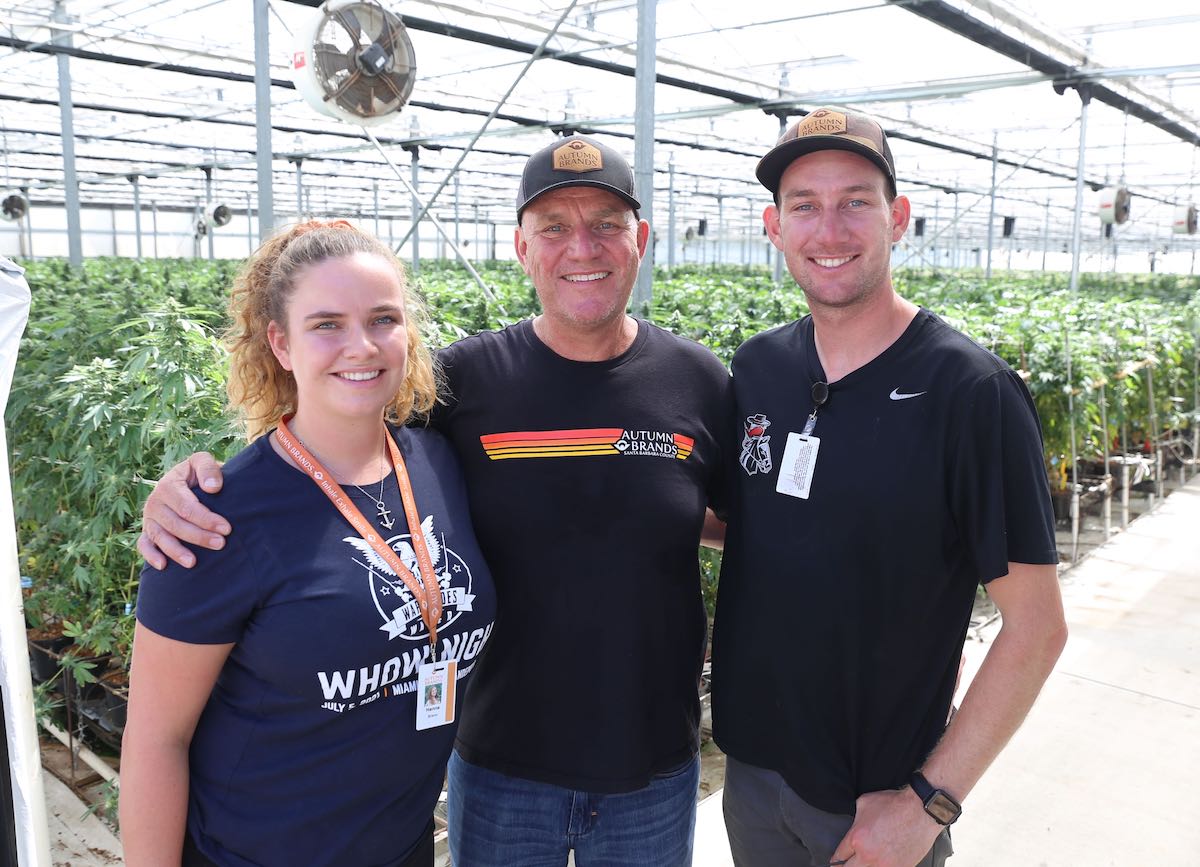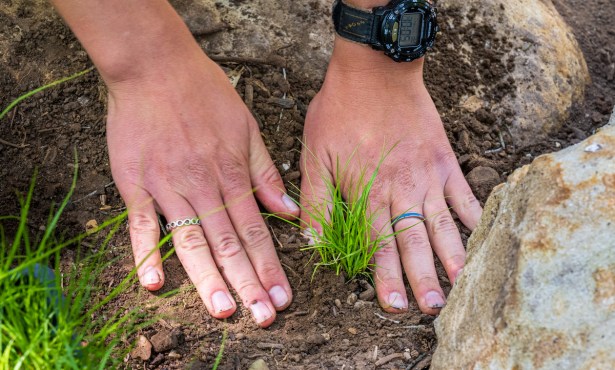Autumn Brands Uses Ladybugs, Not Insecticides, to Control Cannabis Pests
Because ‘You Can’t Wash Your Weed,’ Carpinteria Farm Owner Explains

Before you get to see the buds, you have to look at the bugs ― the ladybugs, that is.
That’s how the farm tour at Autumn Brands in Carpinteria begins, with the admonition to pay attention not so much to the tall cannabis plants that fill these large greenhouses, but rather to the tiny insects and larvae that colonize them.
For Hans Brand and his adult children, Hanna and Johnny, the dream of building a successful company out of their greenhouses in Carpinteria depends on maintaining strict standards, many of which relate to government regulations while others are strictly their own, such as their insistence on raising their crops without the use of insecticide sprays. Hans likes to credit Johnny, who has a degree in agricultural science from Cal Poly, with the solution they’ve found. “You can use organic pesticides,” he told me, “but obviously, whatever you spray on the plants, it stays there. You can’t wash your weed.”

Saving Jobs: Hans Brand had to part ways with some of his workers when the cut-flower industry went south. He’s since hired many of them back. | Credit: Tamer El-Shakhs Photos
The decision to choose insects over insecticides dates back to the beginning of the Autumn Brands project, three and a half years ago. Over that time, the Brand family has tested different strains and worked with different combinations and ratios of insects to combat the aphids that can destroy the plants. Unlike with a spraying regime, the goal is not the total elimination of pests, but rather the establishment of a natural balance, one that allows even the aphids a way to survive, just not at a level that would limit production too drastically.
“We spend about a third less on pest control than we used to,” says Hans, whose experience in horticulture goes back to the days when these greenhouses were used to grow roses and other cut flowers. He acknowledges that this new method means more work and a slightly less productive farm, but he’s willing to accept that bargain. “Believe me,” he said, “we’ve lost some crops.”
Such is the ethos of those who have arrived in the cannabis industry from a background in family-owned and -operated horticulture. The Brands are a product of a long tradition in Carpinteria of farmers, mostly Dutch, who early on recognized that this microclimate would be ideal for their greenhouses. Over the past several decades, they have witnessed the decimation of the market for flowers by globalization, and now the advent of legal cannabis as a financially attractive alternative to a business that would not have allowed them to keep their properties. Surveying the complex of modern trays and rollers imported from Holland that allow the staff at Autumn Brands to grow and move their crops without once touching their pristine flowers, it’s easy to see the appeal of this new venture, which allows men like Hans Brand to pay their workers, offer them benefits, and provide a lucrative legacy to their families.
Sign up for Indy Today to receive fresh news from Independent.com, in your inbox, every morning.
This sense of honoring the place through caring for its native sons and daughters even extends to the ladybugs. “They are the native California ladybugs and they do not have little spots on them,” Hans explained. “They come to lay their larvae and do their thing.” Entomologists from UCSB have studied Autumn Brands and they concur; these ladies are locals.
For Johnny Brand, the decision to return to Carpinteria and work in the family business was something that required patience and even a degree of secrecy. As an agriculture student, he didn’t necessarily tell his classmates or his teachers what the family had planned. Now, both Johnny and sister Hanna, who also graduated from Cal Poly, can embrace the partnership that their father has formed with co-owner Autumn Shelton, and even bring interns to the property from the same college program that they attended.

A Bug’s Life: A species of spotless ladybugs native to California keeps aphids at the Carpinteria farm in check. | Credit: Tamer El-Shakhs Photos
For the Brand family, the elaborate system of metrics imposed by the state of California on cannabis, however arduous and painstaking it may be, represents liberation rather than constraint, as it removes their business from the threat of delegitimation. Their insistence on the no-spray policy reflects adherence to an ideal of providing a product that’s pure, and that presents as little potential for liability as possible. While they joke about the fact that they need to have a specific license and manifest simply to move their crop from one greenhouse to another, the overall feeling is that compliance is their friend.
The transition to cannabis meant Brand was able to rehire some of the same people who worked for him when he grew cut flowers, and he’s clearly proud to have had the opportunity to rectify what were painful decisions in the past. “For them, it’s a really good change,” he told me “In the end of the flower industry, we had to take away some of these retirement plans and lower the cost of insurance, but now we can replace all that again. If you look back five or six years ago, the wages today are at least double.” Several of the crew have recently celebrated 30-year anniversaries with the company.
Recalling the early days of his involvement with legal cannabis, back when the market in California was strictly medicinal, Brand describes stepping back from a venture that involved three other partners. “I didn’t like where it was going,” he told me. “Not that they were not good, I just didn’t see a future for my kids.” He credits Autumn Shelton, his partner and CFO, with providing him with the trust and stability he needed to create something that he could hand down to the next generation.
Not that it’s going to be easy. Looking at his son and daughter, joined now by their mother as we prepare to depart, Brand says this to them with a smile, “I didn’t say I’m going to give it to you guys. You can go to work for it as your company, but do understand that I’m going to work a lot less because I worked a lot in my life already.” From the expressions all around, it’s evident that the time has come for Hans Brand to begin to relax. The next generation, along with the ladybugs, has got his back.
Support the Santa Barbara Independent through a long-term or a single contribution here.




You must be logged in to post a comment.